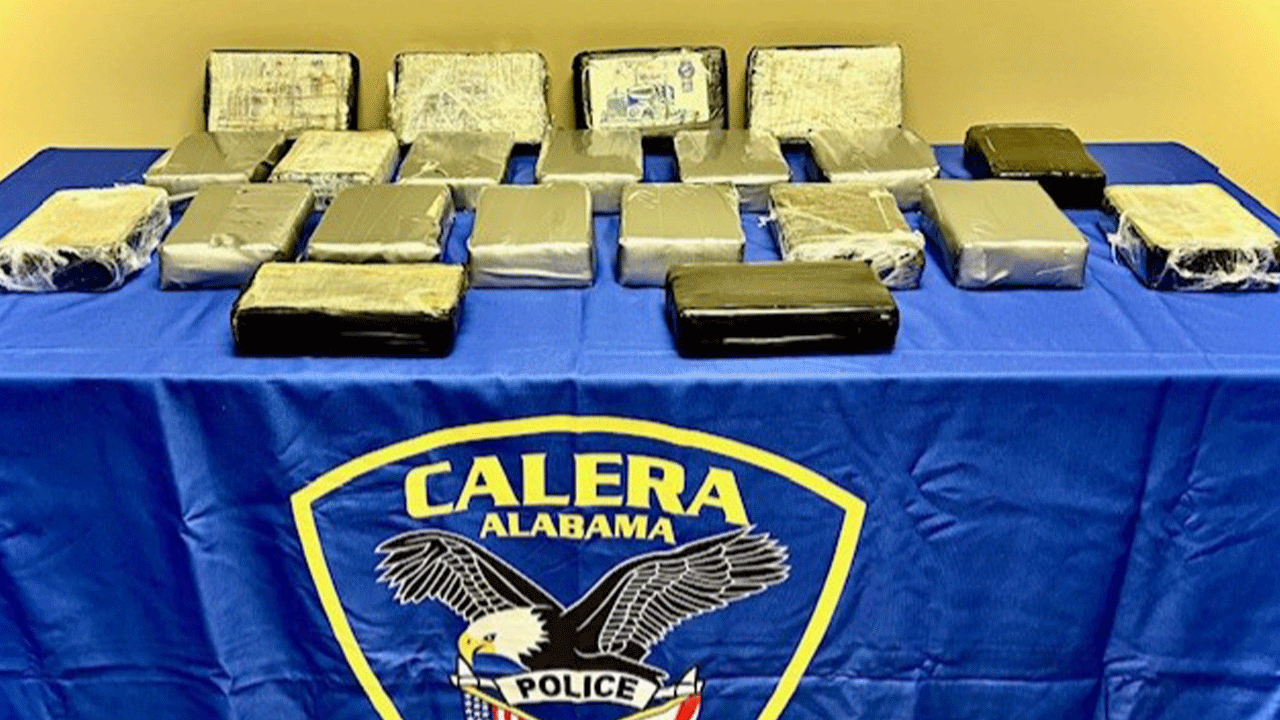United States
Alabama officer’s minor traffic stop leads to discovery of cocaine being trafficked by illegal aliens

In a small Alabama town, a routine traffic stop by the Calera Police Department led to a significant discovery in the war on drugs. Last week, a patrol officer pulled over a vehicle for a minor violation—failing to display a proper tag. While the stop initially seemed insignificant, it ultimately uncovered a much larger issue. Police Chief David Hyche explained that during the stop, officers developed probable cause to search the vehicle. What they found was shocking: 46 pounds of cocaine, a haul with a yet-to-be-determined monetary value that will be assessed by Homeland Security Investigations (HSI). The two men in the car, both from Colombia and in the U.S. illegally, were arrested and charged with cocaine trafficking. One of the men was also wanted in Atlanta for drug trafficking and failure to appear in court. The case has drawn attention not only for its magnitude but also for the broader issues it highlights about illegal immigration, drug trafficking, and law enforcement strategies.
Chief Hyche emphasized that the situation could have turned out very differently if the two men had not made the choices they did. “We didn’t initially know where these two were from, what they had in their car, or their immigration status,” Hyche said, underscoring how routine traffic stops can sometimes lead to much larger discoveries. The men, believed to have been traveling from California to Miami, reportedly took an unusual route through Alabama in an attempt to avoid drug interdiction areas. However, their efforts to evade detection were unsuccessful. Hyche noted, “If they chose I-65 to avoid heavy drug interdiction areas, it didn’t work out for them.” The police department is now working closely with federal agencies, including HSI, to pursue additional charges related to both drug trafficking and immigration violations.
The case has also sparked discussions about the importance of traffic stops, even for minor violations, in combating crime. In recent years, some law enforcement agencies across the U.S. have moved away from making stops for minor infractions, often due to criticism or accusations of over-policing. However, Chief Hyche has been a vocal advocate for such stops, pointing to instances where they have led to significant outcomes, such as the rescue of endangered children. “Many departments around the U.S. have ceased making stops for minor traffic violations,” Hyche said. “I have repeatedly spoken out against this and other instances where law enforcement leaders apologize for enforcing the law or change policy to appease critics. We in law enforcement don’t make laws; we enforce them.”
Hyche also addressed the broader issue of drug trafficking and its connection to border security. He compared the current state of drug availability to when he first started his career in law enforcement decades ago. Back then, drugs like cocaine and heroin were relatively scarce and expensive, but today, they are cheap and widely available—a situation he attributes to the large quantities of drugs pouring across the U.S.-Mexico border. “If we control the borders, the dope would be expensive,” Hyche said, adding that the solution to the drug problem lies at the border, not in local communities. His comments reflect a growing frustration among law enforcement officials about the challenges of combating drug trafficking without stronger border security measures.
The bust has been celebrated as a major victory for the Calera Police Department and its partners in federal law enforcement. Shelby County District Attorney Matt Casey praised the department for “their great work protecting our community” and noted that the two suspects are being held on $10 million bond each. Chief Hyche believes this may be the largest drug seizure in Shelby County’s history, highlighting the significance of the operation. The case also underscores the importance of collaboration between local and federal agencies in addressing complex issues like drug trafficking and illegal immigration.
In conclusion, the discovery of 46 pounds of cocaine in a small Alabama town serves as a stark reminder of the ongoing challenges posed by illegal drug trafficking and immigration. The case is a testament to the critical role that routine traffic stops and proactive law enforcement can play in keeping communities safe. While debates about policing strategies and border security continue, incidents like this one highlight the need for a multifaceted approach to addressing these issues. For now, the Calera Police Department’s actions have taken a significant amount of drugs off the streets and brought two alleged traffickers to justice—a outcome that no doubt resonates with the local community and beyond.


















